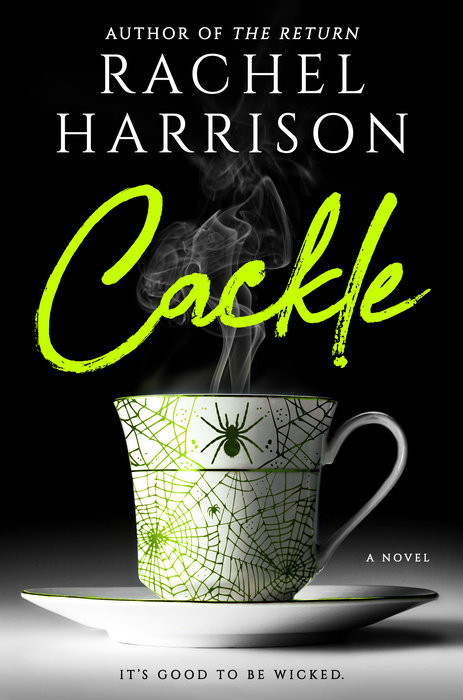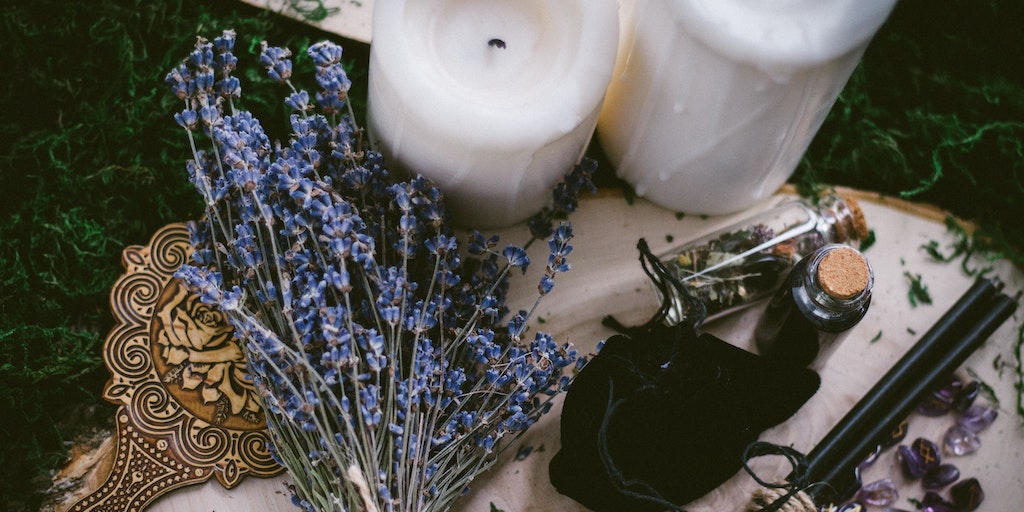“I’m not brave enough to be who I am,” Cackle’s protagonist Annie, newly thirty and freshly dumped, bemoans as her attempts to start a second act outside of New York City fizzle into lonely nights of binge-drinking. As a mantra, it starts out bleakly self-loathing; Annie both craves and fears fully embracing some unwashed, antisocial, decaying crone archetype. But by the end of Rachel Harrison’s new novel, the who Annie could be has transformed, as if by magic, from someone who gives up to someone who stops giving a fuck—and looks fabulous doing so. And that’s all because of her witchy new friend Sophie, and the incredible possibilities that she reveals to Annie in this tricksy story that turns out to be a surprisingly feminist treat.
Harrison’s sophomore horror offering starts out with the intensely familiar: her college-era relationship falling apart right at a milestone birthday sends Annie fleeing her longtime New York home for the apple-picking idyll of the Hudson Valley, where she sets up as a high school teacher in the fictional town of Rowan. But while both her students and her neighbors are slow to warm up to her, and her let’s-stay-friends ex Sam is giving her the infinite ellipses treatment in his texts, shy Annie is shocked to immediately strike up a rapport with Sophie. Sophisticated, wise in the ways of the world, and exceedingly generous in her hospitality and mentorship, Sophie seems like an unbelievable savior, the quintessential gingerbread house in the woods for friend-starved Annie.

But just like that fairy tale cottage, there’s a catch: Sophie seems otherworldly in her glamour and perspective because she is not of this world; and Annie’s association with her, for all that it conjures languid afternoons at Sophie’s castle eating homemade pie and spinning around in fancy dresses, hews uncomfortably close to a devil’s bargain. (Fair warning that if you have severe arachnophobia, you may find the casual cameos from spiders of increasing size and frequency too shuddery.) There’s a funny recurring bit in which Sophie plainly reveals her magical nature to Annie on multiple occasions—like delivering a deadpan offer to curse someone—but Annie, thinking her friend is merely sarcastic, fails to catch the subtext until Sophie finally spells it out for her. This occurs early enough that the majority of Cackle concerns Annie’s dilemma over whether to accept her new friend, warts and all.
There are a number of thematic echoes back to Harrison’s debut horror novel The Return, but if that book was riffing on a Lifetime thriller (longtime girlfriends’ reunion crashed by a demonic version of their lost bestie), Cackle transplants us into a cozy Hallmark film and then steadily subverts the setting. Rowan sounds like the perfect upstate New York hamlet in which to restart one’s life, with cute shops (coffee, candles, spirits) and a weekly farmer’s market where everyone greets one another. But while Sophie waltzes through town like a dark Disney princess who has spent hundreds of years handpicking these local delights, the proprietors are all clearly paralyzed by their fear of getting on her bad side.
Sophie immediately begins calling Annie “pet,” a fitting endearment as the younger woman very much resembles a witch’s familiar: bird-thin and cursed with the last name Crane, she gets unfortunate avian comparisons from students and blind dates alike. But as she becomes emboldened by Sophie’s protection and eventual teachings, Annie must find the balance between leaning into the worst version of herself as others see her and still acknowledging the darkness inside her, and the legitimate resentment she fosters for those who once took her love for granted. Yet as much as she admires and emulates Sophie… she doesn’t entirely trust her.
What’s refreshing about this take is that once Annie begins to come into her own magical powers, the conflict does not pivot in the direction of Marvel’s WandaVision, with dueling witches fighting over the heads of the charming town’s terrified residents. Harrison deftly explores the complicated dynamics among the three generations at play—four-hundred-year-old Sophie, thirty-year-old Annie, and her teenage student Madison—who are not fueled by competition but instead linked by the wisdom of experience passed down. Each sees herself reflected in the younger woman, yet also holds up a mirror so that the more insecure one can glimpse her own potential.
That said, some of the book’s characters or relationships come across as underdeveloped, from Madison’s brief bonding moments with Annie to local coffee shop owner (and attractive single dad) Oskar, who seems to be set up as a love interest yet never gets beyond the role of Concerned Townsperson. In keeping Annie at a distance from the rest of Rowan, Harrison unintentionally undercuts the importance of any supporting characters who aren’t one of the two witches.
Yet clearly romance is not the key to Annie’s self-actualization: Sophie gives her enough compelling (if overly prescriptive) speeches about her own trust issues, after centuries of the townspeople and their descendants trying to burn, drown, or otherwise incapacitate her. It would seem that no one can understand Annie but another female pariah who’s already been there—that, and her fuzzy li’l arachnoid sidekicks.
Where Harrison is most clever is in not depicting Annie and Sophie’s friendship as some treacly catch-all for their respective issues. Sophie’s strong personality and centuries of conviction makes her controlling, both in withholding the grislier details of her past and in subtly cutting off Annie’s connections to Sam or other potential allies. Yet she’s also the only person in Rowan, or back home, who really sees Annie. At one point Annie has a mini-epiphany that she, like many young women, latched on to hobbies and identities solely because of whatever boy she was dating at the time. In some ways, Cackle could be read as a continuation of that codependent behavior, as Annie’s nascent powers don’t have a clear origin point. I appreciate that Harrison keeps these aspects ambiguous, allowing for multiple interpretations or projections based on readers’ own varying friendships.
While Cackle could have spent fewer pages on Annie’s fall to rock bottom and more on her flight back up, the book keenly interrogates how women are often forced to compromise on modern relationships, be they romantic or platonic, and how triumphant it can be when they break those destructive cycles. “Maybe the hardest thing for me to believe was that Sophie would want to be my friend,” Annie muses, contemplating that first suspension of disbelief required on her part—because after that initial gesture of friendship, nothing but magic follows.



